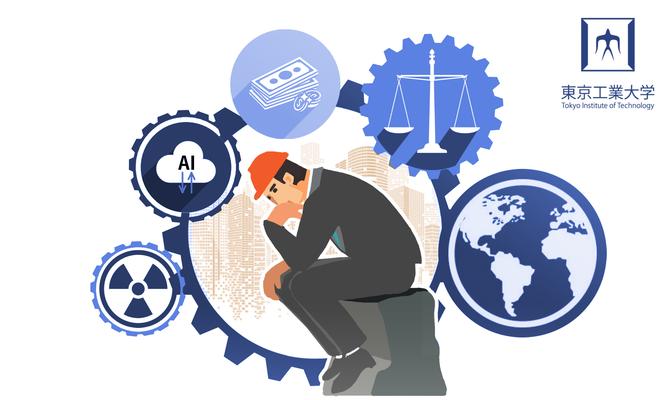About this course see below for course syllabus in Japanese (コースシラバスは以下です)
Course title: “東工大の科学技術(人工知能データ)倫理・ Tokyo Tech Science, Engineering and AI Data Ethics”
Learn both traditional and aspirational ethics to utilize your science and engineering expertise to improve human well-being. This course is a modified version of the edX MOOC on Science and Engineering Ethics, which was released in 2017 in Japanese. This online course in English and Japanese contains new quizzes and materials on Artificial Intelligence (AI) and Data Ethics, including case studies on ethical issues in developing self-driving cars, AI related health care decision making, and water pollution, etc. To the original course a new section was added on Artificial Intelligence and Data Ethics. The course was updated in 2021 and several new sections were added including a lecture on AI for Social Good.
Course Topics:
Unit 1: Why is Engineering Ethics a Current Focus of Attention?
Unit 2: Engineer Ethical Thinking
Unit 3: Seven-step Guide to Ethical Decision Making
Unit 4: How Should Scientists and Engineers Make Ethical Decisions?
Unit 5: Researcher Ethics
Unit 6: Engineering Ethics 2.0
Unit 7: Artificial Intelligence (AI) and Data Ethics
Science and Engineering Ethics learning objectives:
1. To recognize the significant social and environmental impact of engineering/scientific solutions
2. To apply practical ethics methods as a seven-step guide to case-studies
3. To critique, analyze, and develop best ethical solutions across micro- to metalevels toward real-world problems.
4. To understand how one behaves in an organization professionally as an ethical engineer through the analysis of case studies.
5. To examine and analyze ethics case studies.
Artificial Intelligence (AI) & Data Ethics Unit
Get a first impression and learn where and how to apply ethical principles when handling advanced technologies like artificial intelligence.
This unit covers three key components including applicable ethical principles, how to demonstrate ethical compliance while considering other important domains e.g. legal obligations and technical limitations.
Learning objectives:
- to understand ethical principles and how to apply them.
- to understand different ethical guidelines and how to apply them.
- to demonstrate concept decisions based on ethical & technical standards.
- to understand possible risks and how to minimize them.
Course target audience: Tokyo Tech faculty, staff and students. Instructor notes are available for unit 7. Please contact Tokyo Tech OEDO General Manager Prof. Cross by email for the instructor notes.
Course Languages
Science and Engineering Ethics (Units 1 - 6)
- Content – Japanese/English
- Assignments/quizzes – Japanese/English
- Video Lectures – Science and Engineering Ethics Japanese Audio with Japanese/English closed captions
- Discussion Board – Japanese and English
- Slides: Japanese and English
AI and Data Ethics (Unit 7)
- All materials (lectures, quizzes, slides, and case study) are in English whereas transcripts are available in English and Japanese.
Grade assessment is by quizzes at the end of units and within selected videos. Learners are expected to achieve a score of 60% or higher for a passing grade in this online course. Tokyo Tech students, take a screen shot of your progress (in the menu bar) to verify you have completed the course which can be used for meeting your graduation requiment.
Case studies are ungraded in units 3 and 7. These were created for self-study or use by instructors in their ethics related classes.
Course Unit Structure:
- Learning Objectives– lists topics covered in the unit and learning expectations
- Contents & Knowledge Check– to help you understand what the Unit is about
- Unit Quiz– to help you gauge your Unit knowledge
- References– Unit resources
2024 Course schedule
- Course Enrollment Starts: April 1, 2024
- Course Starts: May 1, 2024
- Enrollment Stop Date: Jan. 31, 2025
- Course end date: Feb. 28, 2025
This is a self-paced course where learners can study it from May 2023 until February, 2024. After the course end date, learners can still have access to course content while they are a student at Tokyo Tech.
Expected self-study effort: 2-3 hours/unit for 7 units
Course Team the course was prepared by Staff in the Online Education Develop Office, Professor and General Manager Jeffrey S. Cross and instructional designer Ms. Saya Goto (2017 course version and former Tokyo Tech employee). The video lectures were prepared and delivered by former Tokyo Tech Prof. Jun Fudano and now a professor at Waseda Univ., IT-Deutschland Global Business Solutions KK, Japan, CEO Mr. Daniel Schwarz and Tokyo Tech GEDES doctoral student John Gayed . OEDO teaching assistants were involved in developing this course and are listed here: Anastasia, May, Ayaka, Cesar, Abraham, Kono, Chen, Tan, Khanh, Ino, Ornida, Shindhu, Anh, Rami, Nopphon, John, Yui, and others.
コースシラバス2024年4月12日 (Course explaination in Japanese below)
コース: “東工大の科学技術(AI・データ)倫理・ Tokyo Tech Science,Engineering and AI Data Ethics”
人間がよく生きること (well-being) を発展するために、学習者の皆さんの科学や工学の専門性に役立つ伝統的かつ志向的な倫理を学びましょう。このコースは2017年度に日本語でリリースされたedX MOOC、科学と工学の倫理の改訂版です。このオンラインコースは人工知能(AI)とデータ倫理の新しいクイズと教材を含んだ英語、日本語のコースです。自動運転、AIでのヘルスケア、水質汚染に関するケーススタディーも含まれています。オリジナルコースにAIとデータ倫理に関する新しいセクションを加えました。
コースの内容
Unit1:なぜ今、科学技術倫理か。
Unit2:技術者が倫理的な意思決定を迫られるとき
Unit3:セブン・ステップ・ガイドによる倫理的意思決定
Unit4:科学者や技術者はどのように意思決定をすべきか?
Unit5:研究倫理
Unit6:技術者倫理2.0
Unit7:人口知能(AI)とデータ倫理
学習目標(科学工学の倫理)
1. 工学的・科学的解決策の重大な社会的・環境的インパクトを認識する。
2. ケーススタディーに対して実用的な倫理手法であるセブン・ステップ・ガイドを応用する。
3. 現実世界の問題に対してマクロからメタレベルにかけて倫理的に最も良い解決策を批判し、分析し発展させる。
4. ケーススタディーの分析を通じて、倫理的な技術者として専門的な組織内でどのように個人がふるまうかを理解する。
5. 倫理的ケーススタディーを評価し、分析する。
人工知能(AI)とデータ倫理のユニット
人工知能のような先進的な技術を扱うときの倫理原則を適用する場所と方法を学びます。このコースの参加者は利用できる倫理原則、法的義務など重要な領域を考慮しながら倫理的コンプライアンスの明示、技術的限界の主要な3つの要素を学びます。
学習目標:
・倫理原則とそれらをどう応用するか理解できる。
・倫理的なガイドラインとその応用の仕方の違いを理解できる
・倫理的、技術的基準をもとに概念的な意思決定を明示できる。
・起こりうるリスクとその最小化を理解できる。
対象:東工大の教職員及び学生
言語
科学工学の倫理(Unit1- 6)
-日本語、英語
・提出物、クイズ - 日本語、英語
・ビデオ講義 - 音声は日本語、英語と日本語の字幕あり。それぞれのページに2つのビデオがあります。上部は日本語音声、日本語のスライドで、下部のものはスライドとポップアップが英語です。
・ディスカッションボード - 日本語、英語
・スライド -日本語、英語
AI・データ倫理(Unit 7)
すべての教材(講義、クイズ、スライド、字幕とケーススタディー)は英語です。ただし、ビデオには日本語訳があります。
成績評価は各ユニットの最後といくつかのビデオに付随したクイズによって行います。このコースに合格するために学習者は60%以上の得点をとることを求められています。このコースは自習形式で、コース修了のための単位はありません。東工大生は、倫理の修了要件を満たしたことを証明するために、メニューバーにあるあなたの進捗をスクリーンショットで撮ってください。
Unit.3,7のケーススタディーには得点がつきません。これらは自習用、もしくは倫理に関連する科目の教員が使用するために作成されました。
コースの構造:
・学習目標
- そのユニットと学習体験によってカバーされるトピックのリスト
・学習内容および確認 - そのユニットの理解を助けるための教材
・ユニットクイズ - そのユニットに関する知識の評価(まとめのクイズ)
・参考文献 - そのユニットで使用した参考文献のリスト
2024年度コーススケジュール
コース開始日:2024年5月1日
新規登録停止日:2025年1月31日
コース終了日:2025年2月29日
これは自習型コースで、学習者は2025年1月31日までであればいつでも参加することができます。それ以降について、東工大に学籍がある間は、教材にアクセスすることができます。
期待される自習努力:一週間に1ユニット、それぞれ2-3時間、全7週
